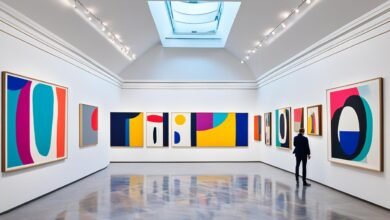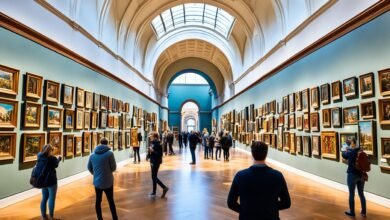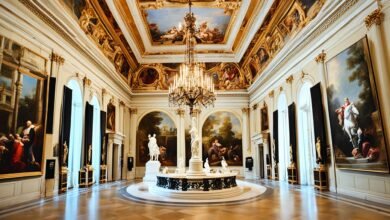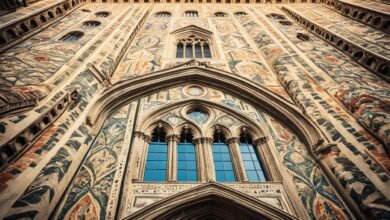Table of Contents
Did you know that Rome’s Doria Pamphilj Gallery holds incredible art? It includes pieces by famous artists like Raphael and Titian. The gallery is in the historic Palazzo Doria Pamphilj. Here, you can see stunning Italian artwork and sculpture. It shows Rome’s culture and art history. Visit to admire beautiful art and learn about the Baroque style.
Discover the History of the Doria Pamphilj Gallery
The Doria Pamphilj Gallery is over five centuries old. It was first owned by the Della Rovere family. Later, the Pamphilj family took over in 1647. Innocent X, who used to be a pope, started the gallery in 1651.
Over the years, the gallery grew. It not only became home to a stunning art collection but also shows the life and culture of the palace’s past owners. Today, you can visit this amazing place and see the history of Italy’s noble families.
Palazzo Doria Pamphilj: A Historical Palace
Palazzo Doria Pamphilj is a grand palace in Rome. It shows off the luxury of the Italian nobility. The palace’s beauty makes it perfect for displaying art.
An Art Collection Preserving Rome’s Cultural Heritage
The gallery is filled with art that tells Rome’s story. It has paintings, sculptures, and more. You can see how Roman art has changed over time.
Palazzo Doria Pamphilj: A Testament to Rome’s Cultural Legacy
By visiting the gallery, you learn about Rome’s and Italy’s history. The palace is full of beautiful art and decor. It shows the wealth and style of the noble families.
| Key Historical Facts | Notable Owners | Year |
|---|---|---|
| Originally belonged to the Della Rovere family | Della Rovere family | 15th century |
| Passed on to the Aldobrandini family | Aldobrandini family | 16th century |
| Became property of the Pamphilj family | Pamphilj family | 1647 |
| Gallery established under Innocent X | Giambattista Pamphilj (Innocent X) | 1651 |
Explore the Art Collection at the Doria Pamphilj Gallery
The Doria Pamphilj Gallery is a paradise for those who love art. It’s home to a brilliant collection that highlights the beauty and skill of Italian artists throughout time. When you step inside, you’re surrounded by a stunning world of art that will amaze you.
Italian Paintings
The gallery shines because of its vast Italian painting collection. It covers works from the Renaissance to the Baroque, giving a complete view of Italy’s art. You can see the soft touch and rich colors in Raphael’s “Madonna of Loreto.” Or dive into the powerful story Caravaggio tells in “Rest on the Flight into Egypt.” Every piece shares a special tale and shows the artist’s talent.
Sculptures and Tapestries
Besides paintings, the gallery includes stunning sculptures and tapestries. View the fine details and life-like looks of old sculptures, proving the skill of these artists. Don’t miss Bernini’s impressive “Bust of Innocent X” or the detailed work in Algardi’s “Flight from Garden of Eden.” The tapestries give the walls more depth, showing stories from myth and history.
Curated Symmetry
Each artwork in the Doria Pamphilj Gallery is placed with care, making a visually stunning experience. The arrangement focuses on balanced harmony and links between the pieces. As you explore, you’ll see how the arrangement boosts the gallery’s impact, making it unforgettable.
| Artist | Notable Work |
|---|---|
| Raphael | “Madonna of Loreto” |
| Caravaggio | “Rest on the Flight into Egypt” |
| Bernini | “Bust of Innocent X” |
| Algardi | “Flight from Garden of Eden” |
Step inside the Doria Pamphilj Gallery and walk through Italy’s colorful art world. Enjoy the paintings, be wowed by the sculptures, and charmed by the detailed tapestries. This collection shares the vibrant and varied Italian art. It’s filled with masterpieces that have lasted through time and still thrill people worldwide.
Experience the Opulent Halls of the Doria Pamphilj Gallery
Visiting the Doria Pamphilj Gallery is like stepping into a world of luxury. Each room has its own beauty, captivating visitors with its charm. Let’s explore the wonders that the gallery holds:
Grand Representative Halls
The grand halls offer a grand introduction. They are filled with fancy furniture and detailed designs. These halls show how the noble families used to live. Imagine yourself among the splendor of the past.
The Velvet Room
The Velvet Room gets its name from the rich velvets that cover its walls. The room shines with delicate weavings and patterns. It’s hard not to admire the effort put into the art here.
The Cadmo Room
The Cadmo Room is a jewel in the gallery’s crown. It holds masterpieces from artists like Raphael and Caravaggio. This room lets you get up close with these famous works, surrounded by the gallery’s beauty.
The Dance Hall
Step into the Dance Hall and you’ll be amazed. It’s filled with paintings of people dancing. The art is lively and colorful, making the scene almost come to life. It’s truly something to see.
Walking through these halls, you’ll feel the majesty of the Doria Pamphilj Gallery. Every room has a unique tale to tell, showing the history and art that make this place special.
| Hall | Description |
|---|---|
| Grand Representative Halls | Introduction to the gallery with luxurious furnishings |
| The Velvet Room | Precious cut-out velvets adorn this remarkable space |
| The Cadmo Room | Heart of the gallery, showcasing prized masterpieces |
| The Dance Hall | Featuring striking paintings depicting lively dance scenes |
Discover the Four Arms of the Doria Pamphilj Gallery
The Doria Pamphilj Gallery’s collection is split into Four Arms, each filled with unique masterpieces. Journey through each arm to discover a world of art:
The First Arm
In the First Arm stands Diego Velázquez’s “Portrait of Innocent X,” a masterpiece showcasing a powerful Roman pope. This section also boasts Baroque era paintings and sculptures, highlighting their artistic brilliance.
The Second Arm
Enter the Second Arm and you’ll find the enchanting Mirror Gallery. It’s a room filled with mirrors decorated with fine designs. The area is a stage for Caravaggio’s artworks. Additionally, Four Small Rooms display more pieces, enhancing your visit.
The Third Arm
The Third Arm welcomes you with a plethora of artworks by famous creators like Correggio and Guido Reni. You will see a large number of panel paintings, each with its unique tale. Enjoy the beauty and skill embodied in these priceless creations.
The Fourth Arm
In the Fourth Arm, explore Parmigianino’s works, admired for their mastery and unique touch. It’s also where you’ll find the bust of Andrea Doria, an influential Italian. Here, marvel at the impressive sculptures and paintings that define their era.
Each part of the Doria Pamphilj Gallery provides a unique and enthralling art experience, spanning centuries of creativity. The Four Arms display a wide variety of art forms, promising a memorable journey through artistic history.
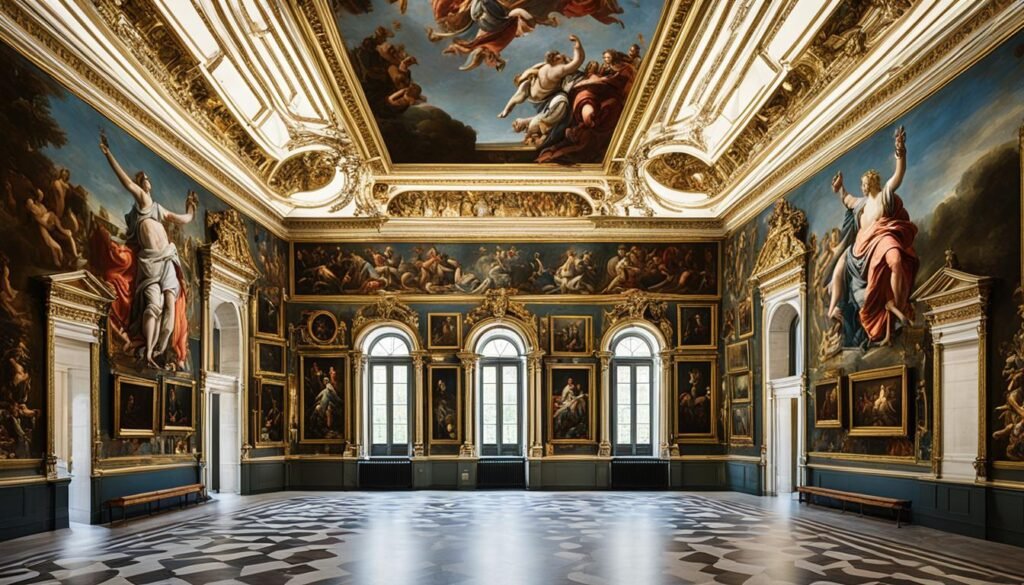
Visitor Information for the Doria Pamphilj Gallery
When thinking about your visit to the Doria Pamphilj Gallery, knowing important details is key. It is positioned at the Palazzo Doria Pamphilj on Via del Corso in Rome. This beautiful gallery is full of history and art you don’t want to miss.
Opening Hours
The Doria Pamphilj Gallery is open every day. Here is the schedule:
| Day | Opening Hours |
|---|---|
| Monday | 10:00 AM – 6:00 PM |
| Tuesday | 10:00 AM – 6:00 PM |
| Wednesday | 10:00 AM – 6:00 PM |
| Thursday | 10:00 AM – 6:00 PM |
| Friday | 10:00 AM – 6:00 PM |
| Saturday | 10:00 AM – 6:00 PM |
| Sunday | 10:00 AM – 6:00 PM |
Tickets
You can get into the Doria Pamphilj Gallery by buying a ticket. This ticket also comes with a reservation. So, you save time and don’t have to wait in a long line. Tickets are sold ahead of time on the web or at the entry. To have a stress-free time, buying your ticket early is best.
Location
The gallery is in the heart of Rome at Palazzo Doria Pamphilj on Via del Corso. It’s simple to get there by bus, metro, or car. Plus, there’s parking nearby for those who drive.
Accessibility
The Doria Pamphilj Gallery aims to welcome all guests. It has ramps and other aids for people in wheelchairs. Experts are ready to lend a hand if you need help.
Audio Guides
Want to learn more? Pick up an audio guide in French, English, or Italian. It shares stories about the art and the gallery itself. It’s a great way to understand the art better.
Now, you’re all set for your special visit. Remember to check the schedule, book your tickets early, and enjoy your trip through history and art.
Delve into the Cultural Legacy of the Doria Pamphilj Family
The Doria Pamphilj Gallery showcases more than just art; it celebrates the powerful Doria Pamphilj family’s culture. A family of Roman nobles, their influence spread for centuries. They greatly impacted the city’s culture. Their support for the arts and owning this gallery have deeply set Rome’s historical importance.
Walking through the gallery, you see the family’s deep love for art. It highlights the support they gave to famous artists. You’ll see stunning works by Raphael and Caravaggio. This gallery shows how devoted they were to art.
If you visit, you get to experience Roman nobility’s history and culture. The lavish rooms and beautiful art reveal the family’s influence on Rome. The gallery is a tribute to their refined taste, power, and their efforts to keep their era’s art alive.
A visit also lets you see the family’s vast art collection. Not just one masterpiece, but many, each telling a unique story. Together, they offer insight into the Doria Pamphilj family’s past and what art they cherished.
This exploration helps you understand the Doria Pamphilj family’s historical importance. Whether you love art or are curious about Roman nobility, you’ll find the gallery enriching. It’s a memorable journey through time and culture.
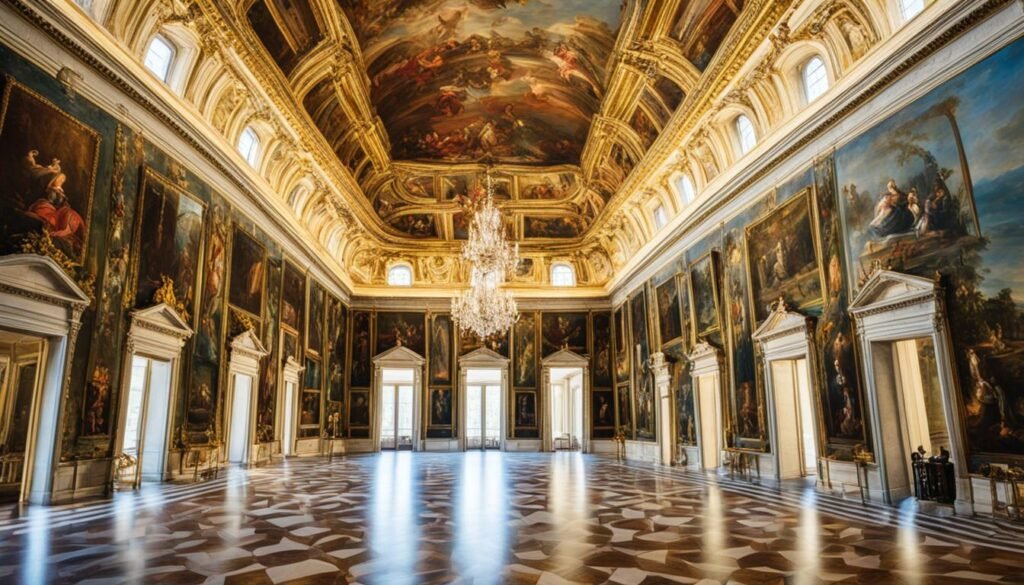
| Key Points | Highlights |
|---|---|
| Cultural Legacy | The Doria Pamphilj family’s influence and power in shaping Rome’s cultural landscape. |
| Art Patronage | The family’s commitment to supporting and promoting the arts. |
| Historical Significance | The gallery’s role in preserving and showcasing the family’s cultural heritage. |
| Roman Nobility | The societal status and impact of the Doria Pamphilj family. |
| Artistic Legacy | The collection’s reflection of the family’s artistic taste and preferences. |
Plan Your Visit to the Doria Pamphilj Gallery
Planning ahead is key for a great visit to the Doria Pamphilj Gallery. It is open every day, and opens later on weekends. You should book tickets ahead online. This way, you won’t wait in line and your visit will go smoothly. For a deeper experience, think about taking a guided tour.
Opening Hours
This gallery is open for you every day:
- Monday through Friday: 9:00 AM – 5:00 PM
- Saturday and Sunday: 9:00 AM – 7:00 PM
Ticket Reservation
Buying tickets early can mean no long lines. You can do this online at the gallery’s website. This lets you pick the best time for your visit. It makes everything smoother and more fun.
Guided Tours
Guided tours make your visit richer and more fun. Knowledgeable guides will show you around. They’ll explain about the art and the gallery’s history. This really adds to your visit.
Visitor Information
Find the gallery at Palazzo Doria Pamphilj on Via del Corso in Rome, Italy.
It’s easy to get around inside, even with a wheelchair.
French, English, and Italian audio guides are available. They tell you more about what you’re seeing. This makes your visit even better.
| Opening Hours | Price | Guided Tours |
|---|---|---|
| Every day: 9:00 AM – 5:00 PM | Adults: $15 | English: 10:00 AM & 2:00 PM Italian: 11:30 AM & 3:30 PM |
| Saturday & Sunday: 9:00 AM – 7:00 PM | Students: $10 | French: 12:00 PM & 4:00 PM |
Immerse Yourself in Art at the Doria Pamphilj Gallery
Step into a world of artistic wonders at the famous Doria Pamphilj Gallery. It invites art lovers and enthusiasts on a journey. You’ll explore Roman art and Italian masterworks in opulent halls.
You’ll see vibrant paintings and expertly carved statues. Each one tells a special story from Italy’s best artists. The gallery showcases Roman and Baroque art, highlighting Rome’s culture and history.
Get ready for a cultural feast at the Doria Pamphilj Gallery. It’s a must-visit for art fans and those exploring Rome’s cultural past. Dive into centuries of Italian art and let the masterpieces tell tales of Rome’s rich history.
